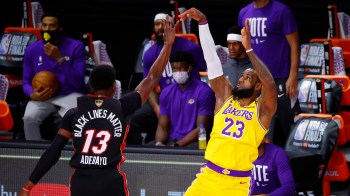Getting tickets for the NBA Finals is a game itself
For Miami Heat season ticket holders, the NBA Finals should be all LeBron jerseys and cocky tweets.
After all, the Heat are one of just four teams to ever play in four straight NBA Finals. And season ticket holders have first crack at snagging highly-coveted playoff tickets and buying them at a relative steal.
“The Eastern Conference Finals will generally go for anywhere from three to four times face value,” says Ayeh Ashong with Miami-based broker Tickets of America. “And the NBA Finals can go for anywhere from four to five times face value.”
Season ticket holders can cover a good chunk — if not all — of their expenses by selling just their conference finals and finals tickets. Depending on where NBA Finals seats are located, says Ashong, tickets can sell for anywhere from $275 to $25,000.
For a subset of season ticket holders, the playoffs becomes a complicated affair. Like a timeshare, some fans join informal season ticket pools with colleagues, friends, and friends of friends.
Ashong says at least twice a year, he turns into a counselor for group season ticket holders. There’s an extra playoff game left. Who gets to go? Should they just sell the seats and split the money?
“Oh wow, we’ve done all kinds of things,” says Ayeh Ashong with Miami-based broker Tickets of America, “from pulling straws to flipping coins.”
Perhaps the easiest way to fairly break up playoff tickets is to liquidate them all and split the profits among the group.
But many season ticket holders, like Gregg Gelber, wouldn’t dream of selling their seat to a stranger. He and six long-time friends share four season tickets. “Like everything with our group, it starts with a spreadsheet,” says Gelber, a financial advisor who keeps obsessive records of who attends which game.
For the playoffs, Gelber’s group uses a rotation system to distribute playoff seats. An order is randomly generated, and each group member gets a ticket when his name is up. Four of the seven guys go to each game this way.
Over the last four years, the group has developed a small bible of playoff-specific rules.
“Giving your ticket to anybody without prior approval is complete banishment,” says Gelber. “Immediately.”
Group members are also prohibited from selling their ticket. “If you can’t go, you can offer to trade. If that is rejected… it goes to the next person automatically,” says Gelber.
In Gelber’s rotation system, all of the group members have the same chances of getting any given ticket. That is one way to think about “fairness.”
But there’s at least one other way. “A property that mathematicians call ‘envy free-ness,’” says Mike Rosenthal, who teaches math at Florida International University.
Rosenthal suggests splitting up season tickets with a method that originated as a way to divvy up an estate when no will had been written: the Knaster system.
“[It] was developed during World War II,” says Rosenthal, “by a Polish Mathematician: Bronisław Knaster.”
Using the Knaster system, each ticket holder would write down what a given game is worth to them. The person who values a game most gets the ticket, but has to reimburse the other members for not going.
And then there’s the Peltz family system. Which is to say no system, really.
The Peltzs have owned a pair of Heat season tickets for about two decades, since their kids were just babies. Now that the Heat are a regular fixture in the Finals, and the kids are adults, there’s a good deal of jostling for use of the family seats.
The youngest son, Jonathan Peltz, used to strategically pass on earlier playoff games to claim the rights to later, more important playoff games.
Last year, Jonathan and his brother Moish were all set to go to one of the first two finals games against the Spurs. At the last second, his sister Maxine booked a flight home from New York.
“Like literally 24 hours notice,” says Jonathan.
Word came down that Maxine would get to go to the game instead of Jonathan.
“I mean I wish I didn’t have to play that card,” says Maxine, “I would have rather been here for all of the playoff games.”
“It’s like a corporation,” says Jonathan, “She’s like: I cleared it with mom. So it’s like then she doesn’t have to ask me.”
Explicit texts were exchanged. A livid Jonathan, at some point, had to be talked down while pacing and fuming. Maxine considered canceling her flight and not coming home.
“[Jonathan] was really mad at me,” says Maxine, “and I was like: this is World War III in the Peltz family.”
Their dad, Arvin Peltz, says at this point he’s essentially given up on ever using the family tickets.
This article includes comments from the Public Insight Network, an online community of people who have agreed to share their opinions with WLRN. A version of this article also ran on WLRN.
There’s a lot happening in the world. Through it all, Marketplace is here for you.
You rely on Marketplace to break down the world’s events and tell you how it affects you in a fact-based, approachable way. We rely on your financial support to keep making that possible.
Your donation today powers the independent journalism that you rely on. For just $5/month, you can help sustain Marketplace so we can keep reporting on the things that matter to you.


















